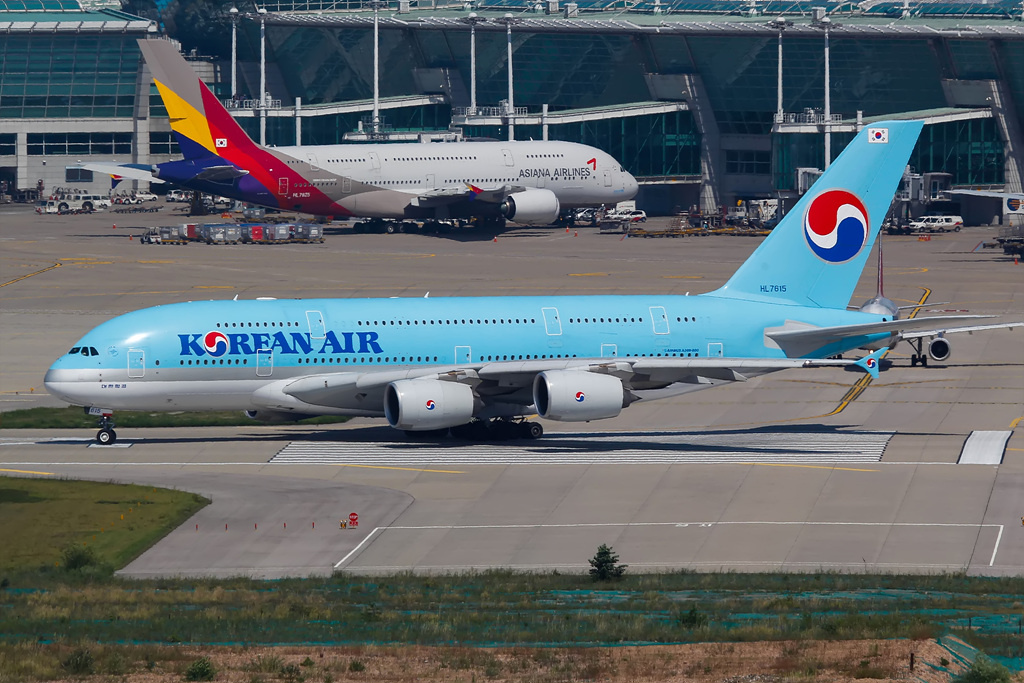
Korean Air now has the funding in place to acquire Asiana after raising nearly $3 billion in capital by issuing new shares.
Korean Air Obtains Funding For Asiana Acquisition
In November, Korean Air announced it would acquire Asiana airlines in a deal worth $1.6 billion. COVID-19 initially hit South Korea hard and both Korean Air and Asiana had been struggling prior to the pandemic.
The deal would merge Asiana into the Korean Air brand and many overlapping routes would be deleted. Since November, Korean Air has obtained the consent of its majority of shareholders to acquire Asiana and is now waiting on final government approval. The South Korean Fair Trade Commission (FTC) is reviewing the application and will render its decision within 90 days.
The Korea Herald noted:
“The carrier plans to make a payment to acquire a controlling stake in Asiana Airlines by June 30, and to spend some 1.8 trillion won to pay debts, including financial leases and aircraft-backed loans, between April and December, according to the company’s filing.”
Combined, the new Korean Air would operate about 60% of international routes to/from South Korea.
While Korean Air has indicated that it intends to keep as many employees as possible, it is difficult to see how the synergies and merger makes sense unless there is consolidation and a trimming of the combined workforce, especially due to lingering border closures and depressed demand from the pandemic.
CONCLUSION
The hope is that Korean Air’s acquisition of Asiana will stabilize the Korean airline industry. While that remains an open question, the merger will likely create additional stability. It will likely come at the expense of consumers, though. Asiana and Korean Air maintained above-average onboard products because they were competing with one another for business. With that competition eliminated, we may see a decline in both innovation and quality onboard. But the merger is now one step closer to becoming a reality.
image: Hyeonwoo Noh




Flown Korean a few times, I liked it. I wish I had the chance to fly Asiana.
Matthew, did you see the news that Etihad lost $1.7 billion in 2020? Do you think it will increase the chances of a merger with Emirates? Now, that would be a story!
Sucks for Star. Often times the only award availability US to Asia.
An underappreciated factor in this KFTC review:
In early 2020, the Korean Fair Trade Commission expressed concern that the Skypass devaluation was an unfair practice and recommended that Korean Air address the matter (this has no legal power, but it is very unusual for companies to ignore such recommendations). Unlike courts in the U.S., the KFTC has an established precedent that miles constitute monetary rights — a form of currency owned by the customers who hold them (and not by the airlines or the issuers of the miles). In May 2020, KE re-submitted an unrevised plan to the KFTC, ignoring all recommendations, and bulldozed ahead with their devaluation plan. This triggered an escalation where the KFTC launched a proper full-fledged investigation of the new terms and conditions.
Now the situation has changed. KE needs to be in the good graces of the KFTC because KE needs the KFTC to approve its merger with Asiana. KE attempted to circumvent this problem by delaying the devaluation by 2 years (so that the KE-OZ merger would be safely settled by the time KE goes to war with the KFTC over Skypass devaluations), but the KFTC said no dice. The KE-OZ merger and the Skypass devaluation are separate independent matters, but the KFTC has stated that guaranteeing fair financial value for customers in the mileage program(s) is part of their antitrust considerations in the KE-OZ merger, and that they want changes in the Skypass program to be settled with terms that are fair to consumers prior to any conclusive evaluation of the effects of the KE-OZ merger on consumer rights.
As such, after a year of investigation, the KFTC is now ordering KE to correct what the KFTC deems unfair practices in the Skypass devaluation. Again, this is not legally binding, and KE can refuse, but then the KFTC can take KE to the courts. KE likely wants to avoid such confrontations at all costs. KE is continuing to plead their case that they have not in fact devaluated customers’ financial rights, but has pledged to work with the KFTC’s process in good faith. The necessary adjustments to the new Skypass terms and conditions are to be finalized by the end of March.
News report in Korean: https://news.mt.co.kr/mtview.php?no=2021012918303626553
“With that competition eliminated, we may see a decline in both innovation and quality onboard”
And possibly higher prices too for some routes.
Yeah, these mergers may be a good thing for the stockholders of a given corporation (in the short term, at least), but they rarely work out well for the consumer. Decreased competition inevitably brings higher prices, lower quality service and a general lack of innovation. Yes, TWA, PanAm, US Airways, etc were struggling. But is the market better off without them? I’m not so sure, because more competition is nearly always a good thing.
There’s a reason why KAL and Asiana are highly regarded by frequent fliers; they appreciate the quality of the service experience on both airlines. Without competition, will the high level of quality remain the same? Only if the airline feels that it’s necessary. Which is usually isn’t when you lack a direct competitor. Yes, I get that Asiana may be struggling financially and perhaps this is the only way out for them (though I would think there may have been other options). But it’s still a big loss for the market as a whole.
There’s still a lot of competition for Korea based travelers. One stop routings through Japan, China, Southeast Asia, or TPAC flights on North American carriers make Seoul and Busan still easy places to reach. Domestically, there was already a lot of competition and the in flight product was far inferior to their international product.
Where Korean consumers lose is having to switch to SkyTeam. OW and Star have their own positives, but there really is no area where SkyTeam is the best.